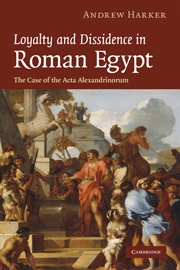Book contents
- Frontmatter
- Contents
- Note on abbreviations
- Chapter 1 Introduction
- Chapter 2 The embassies to Gaius and Claudius
- Chapter 3 The Acta Alexandrinorum: Augustus to the Severans
- Chapter 4 The Acta Alexandrinorum: The historical background
- Chapter 5 Between loyalty and dissent: The Acta Alexandrinorum and contemporary literature
- Chapter 6 Conclusion
- Appendix I Editions of the Acta Alexandrinorum and related texts
- Appendix II The status of the Alexandrian Jews
- Appendix III The ‘dubious or unidentified’ fragments
- Bibliography
- Index
Chapter 2 - The embassies to Gaius and Claudius
Published online by Cambridge University Press: 22 September 2009
- Frontmatter
- Contents
- Note on abbreviations
- Chapter 1 Introduction
- Chapter 2 The embassies to Gaius and Claudius
- Chapter 3 The Acta Alexandrinorum: Augustus to the Severans
- Chapter 4 The Acta Alexandrinorum: The historical background
- Chapter 5 Between loyalty and dissent: The Acta Alexandrinorum and contemporary literature
- Chapter 6 Conclusion
- Appendix I Editions of the Acta Alexandrinorum and related texts
- Appendix II The status of the Alexandrian Jews
- Appendix III The ‘dubious or unidentified’ fragments
- Bibliography
- Index
Summary
INTRODUCTION
The historical events of ad 38–41 feature prominently in the surviving Acta Alexandrinorum stories. In ad 38 there was violent rioting in Alexandria between the Greeks and Jews of the city. In the aftermath of this disturbance both sides sent embassies to Rome charged with persuading Gaius Caesar to give a ruling on the issues lying behind the dispute which was favourable to themselves and detrimental to their opponents. The Alexandrian Greeks entertained great expectations of success. Gaius was well disposed towards them and showed great respect for his great-grandfather Mark Antony, whom they had supported in the civil wars of 31–30 bc. Gaius' father Germanicus had enjoyed a rapturous reception from the Greeks when he visited the city in ad 19. Several of Gaius' influential advisers were Alexandrian Greeks themselves and were sympathetic towards their embassy. Gaius stressed his love for the city and his desire to visit it. Moreover Gaius adopted several policies later in his reign that were damaging to the Jews in the empire.
However, the Alexandrian Greek embassy was not successful. Gaius was assassinated on 24 January ad 41 apparently before he could deliver a written ruling. Both sides dispatched further embassies to congratulate his successor Claudius on his accession and to obtain a decision on the unresolved matters. Again the Alexandrian Greeks had high hopes of persuading an emperor who was Mark Antony's grandson and Germanicus' brother to support them.
- Type
- Chapter
- Information
- Loyalty and Dissidence in Roman EgyptThe Case of the Acta Alexandrinorum, pp. 9 - 47Publisher: Cambridge University PressPrint publication year: 2008
- 1
- Cited by

